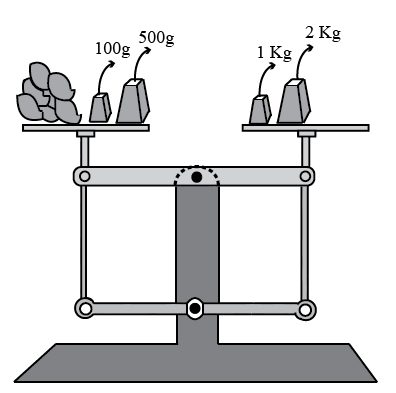5th Grade > Mathematics
MEASUREMENTS MCQs
Total Questions : 40
| Page 2 of 4 pages
Answer: Option D. -> 3.2 kg
:
D
Weight of 1 dumbbell=800g⇒Weight of 4 dumbbells=800g×4
=3200g
Since the options are in kilograms, we need to convert 3200 g to kg.
When we convert a smaller unit (g) to a larger unit (kg), we divide the given measure by the conversion factor.
1kg=1000g
⇒3200g=32001000kg
=3.2kg
Thus, the weight of 4 dumbbells is 3.2 kg.
:
D
Weight of 1 dumbbell=800g⇒Weight of 4 dumbbells=800g×4
=3200g
Since the options are in kilograms, we need to convert 3200 g to kg.
When we convert a smaller unit (g) to a larger unit (kg), we divide the given measure by the conversion factor.
1kg=1000g
⇒3200g=32001000kg
=3.2kg
Thus, the weight of 4 dumbbells is 3.2 kg.
Answer: Option B. -> 650
:
B
We know that,
1 Litre = 1000 mL
We already have 350 mL,
⇒1000 mL - 350 mL = 650 mL
∴ 1000 mL = 350 mL + 650 mL
:
B
We know that,
1 Litre = 1000 mL
We already have 350 mL,
⇒1000 mL - 350 mL = 650 mL
∴ 1000 mL = 350 mL + 650 mL
Answer: Option C. -> Kilometre
:
C
Kilogram (kg) and milligram (mg) are the units of mass.
Millimetre (mm) is the unitused to measure the length of verysmall objects like the length of a pin, seed etc.
Kilometre(km) is the unitused to measure long distancesbetween two places.
:
C
Kilogram (kg) and milligram (mg) are the units of mass.
Millimetre (mm) is the unitused to measure the length of verysmall objects like the length of a pin, seed etc.
Kilometre(km) is the unitused to measure long distancesbetween two places.
Answer: Option D. -> 12
:
D
1L=1000mL
⇒3L=3×1000mL
=3000mL
Therefore, thequantity of juice Tina wants to buy equals 3000 mL.
Since the store sells only 250 mL cartons, the number of such cartons that Tina has to buy is given by 3000250=12.
:
D
1L=1000mL
⇒3L=3×1000mL
=3000mL
Therefore, thequantity of juice Tina wants to buy equals 3000 mL.
Since the store sells only 250 mL cartons, the number of such cartons that Tina has to buy is given by 3000250=12.
Answer: Option C. -> 1 m = 100 cm
:
C
We know that,
1 m = 100 cm
1 km = 1000 m
1 cm = 10 mm
∴ Inthe 4 given options,1 m = 100 cm is correct.
:
C
We know that,
1 m = 100 cm
1 km = 1000 m
1 cm = 10 mm
∴ Inthe 4 given options,1 m = 100 cm is correct.
Answer: Option B. -> 2.4 kg
:
B
Weight of mangoes + 100 g+ 500 g=1 kg + 2 kg
⇒Required weight+ 600 g=3 kg
⇒Required weight=3 kg - 600 g
To move ahead, we need to convert the units. Since we need the final answer in kilograms, let us convert 600 g to kilograms.
1kg=1000g
⇒600 g=6001000kg
=0.6kg
∴Weight of mangoes=3 kg - 0.6 kg
=2.4 kg
:
B
Weight of mangoes + 100 g+ 500 g=1 kg + 2 kg
⇒Required weight+ 600 g=3 kg
⇒Required weight=3 kg - 600 g
To move ahead, we need to convert the units. Since we need the final answer in kilograms, let us convert 600 g to kilograms.
1kg=1000g
⇒600 g=6001000kg
=0.6kg
∴Weight of mangoes=3 kg - 0.6 kg
=2.4 kg
Answer: Option C. -> 8 cm
:
C
Initial position of the ant = 2 cm
Ant goes 3 cm forward = 2 cm + 3 cm =5 cm
Ant goes 2 cm backward = 5 cm - 2 cm = 3 cm
Finally, the ant goes 5 cm forward = 3 cm + 5 cm = 8 cm
∴ The final position of the ant is 8 cm
:
C
Initial position of the ant = 2 cm
Ant goes 3 cm forward = 2 cm + 3 cm =5 cm
Ant goes 2 cm backward = 5 cm - 2 cm = 3 cm
Finally, the ant goes 5 cm forward = 3 cm + 5 cm = 8 cm
∴ The final position of the ant is 8 cm
Answer: Option C. -> 5 mL
:
C
We know that spoon is a small object which can hold very little quantity of liquid.
Here, millimetre (mm) and centimetre (cm) are the units of length.
A litre is used to measure a large quantity of liquid.
Therefore, milk in a spoon is approximately 5 mL.
:
C
We know that spoon is a small object which can hold very little quantity of liquid.
Here, millimetre (mm) and centimetre (cm) are the units of length.
A litre is used to measure a large quantity of liquid.
Therefore, milk in a spoon is approximately 5 mL.
Answer: Option C. -> 1000 mL
:
C
When we convert a larger unit (L)to a smaller unit (mL), we multiply by the conversion factor.
Hence, 1 L = 1×1000 = 1000 mL
:
C
When we convert a larger unit (L)to a smaller unit (mL), we multiply by the conversion factor.
Hence, 1 L = 1×1000 = 1000 mL
Answer: Option C. -> 800
:
C
When we convert alarger unit (hectometre) to a smaller unit (metres)we multiply by the conversion factor.
1 hectometre = 100 m
Hence 8 hectometres = 8 × 100= 800 m
:
C
When we convert alarger unit (hectometre) to a smaller unit (metres)we multiply by the conversion factor.
1 hectometre = 100 m
Hence 8 hectometres = 8 × 100= 800 m


















